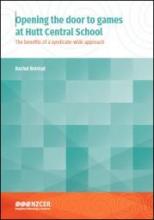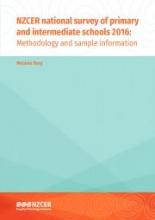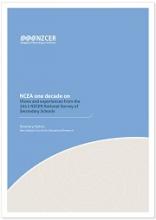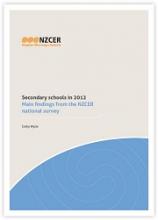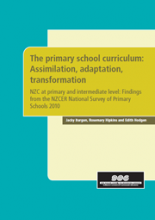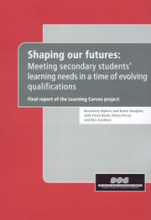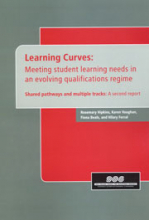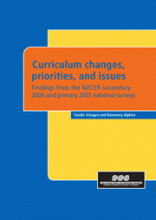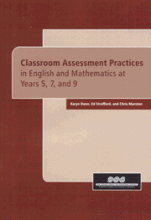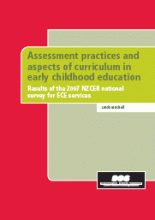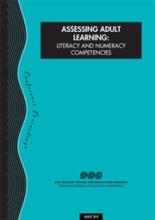NZCER's Curriculum and assessment work
You are here
Curriculum and assessment
Recent Curriculum and assessment research publications
Curriculum, assessment and reporting to parents and whānau - findings from the NZCER 2019 National survey of English-medium primary schools
This report presents the findings from a research project on curriculum integration in New Zealand schools, carried out by NZCER in 2018–19.
This report describes sampling and analysis details for the NZCER national survey of primary and intermediate schools 2016, as well as respondent characteristics and characteristics of the schools with which respondents are associated. It supports the individual thematic reports that use the 2016 National Survey data.
This report presents findings from a case study at Pakuranga Intermediate on their collaboration with a group of performing and visual artists in 2012-2014. It's part of a wider NZCER investigation into successful and sustained collaborations between schools, communities and professional experts.
This 2015 report updates the findings from a large multi-method study of environmental education in New Zealand schools, done in 2002-2004. The update report will be of interest to schools and environmental education providers and stakeholders who support schools.
What are New Zealand secondary students' experiences with money and financial products, and how do they behave towards money? This research report also looks at what schools offer in terms of financial literacy programmes and any barriers to the implementation of financial literacy teaching. The research was commissioned by the Commission for Financial Capability (previously the Commission for Financial Literacy and Retirement Income).
This report explores teachers' practice and thinking about one of the eight principles in the New Zealand Curriculum, learning to learn. It draws on data from teachers' responses to NZCER's 2012 National Survey of Secondary Schools.
This new free "rapid prototype" resource will be of particular use in school staff professional development workshops, and can also be used or adapted for use with students, parents, school Boards of Trustees, and anyone with an interest in what and how young people learn, and how education could be organised in the future. It invites groups to explore their current thinking and to imagine alternatives that provoke new questions about knowledge, and the roles, relationships, and structures that are needed to support future-oriented learning.
This report documents views and experiences of NCEA from NZCER's 2012 National Survey of Secondary Schools. It shows support for NCEA has remained high among principals and consolidated among teachers, school trustees and parents. It’s the first time parental support has risen above 50 percent in the survey series and it was higher among parents with a child in the senior school.
Schools have generally welcomed the recent changes to NCEA such as endorsement of whole courses with merit or excellence and the increased support provided by best practice workshops for teachers. However the report shows the high teacher workload associated with NCEA remains unresolved. It also explores views on whether NCEA is driving the curriculum and includes responses to the Government’s recently announced policy target that by 2017, 85 percent of students should gain an NCEA Level 2 qualification or its equivalent.
Secondary schools in 2012 is the latest from NZCER's national survey series.
The survey draws on responses from 177 secondary school principals and from hundreds of teachers, parents and members of boards of trustees. The survey was carried out in July and August 2012. It is part of a national survey series conducted by NZCER since 1989 to track issues and trends across the education system.
There are many positives in the findings but they also highlight persistent concerns about funding levels, workload, support and access to reliable technology.
.
The latest report from the NZCER national survey series looks at how the New Zealand Curriculum (NZC) is being implemented in the country's primary and intermediate schools. The primary school curriculum: Assimilation, adaptation, transformation draws on data from our 2010 survey to explore differences across the sector in terms of progress on curriclum implementation, three years on from the publication of the NZC in 2007. Issues covered in the report include: how confident principals and teachers are with the curriculum, which aspects they view as most important, the professional learning teachers are doing and the challenges of creating a curriculum to meet the learning needs of all students.
This paper describes some of the findings from an evaluation of the Fruit in Schools (FiS) initiative. It outlines how the community development and health promotion approaches used by FiS schools offered students increased leadership opportunities.
This chapter deals with questions of maths assessment.
This interim research report provides examples of how some schools have approached the revised curriculum and the Key Competencies, and discusses the processes, tensions, and opportunities of leading and managing curriculum change.
This research report provides examples of how some schools have approached the revised curriculum and the Key Competencies, and discusses the processes, tensions, and opportunities of leading and managing curriculum change.
This article provides examples of how some schools have approached the revised curriculum and the Key Competencies, and discusses ways of leading and managing curriculum change.
This paper discusses the possible purposes for assessing the Key Competencies, and the assessment approaches that fit with these purposes.






